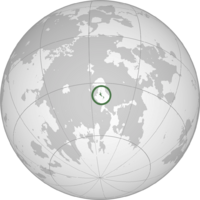Paxaklemtorno
This article is incomplete because it is pending further input from participants, or it is a work-in-progress by one author. Please comment on this article's talk page to share your input, comments and questions. Note: To contribute to this article, you may need to seek help from the author(s) of this page. |
Kingdoms of Paxaklemtorno | |
|---|---|
| Motto: Numixaseredenjixaseol Free of bonds, free of pain | |
| Anthem: Selessmapexliana Sea of Stars | |
 Location of Paxaklemtorno in Anteria | |
| Capital | Niquenunipe |
| Official languages | Tqennin Auawan-Setumun |
| Ethnic groups (2020) | 54% Tqennu 22% Au 14% Setumue 8% Foreign Nationals 2% Other |
| Religion (2020) | 97% Qwesmenu 2% Christianity 1% Other |
| Demonym(s) | Passashan |
| Government | Federal semi-direct assembly-moderated democracy under an executive constitutional monarchy |
• Queen | Yuohe ka Laiwanixe II |
| Andiras Xenella | |
| Legislature | Federal Moxodis |
| Council of Corners | |
| Popular Assembly | |
| Formation | |
| June 7th, 1232 BC | |
| August 23rd, 277 BC | |
| January 2nd, 571 | |
| November 7th, 1920 | |
| Area | |
• Total | 23,921 km2 (9,236 sq mi) |
| Population | |
• 2022 estimate | 9,060,000 |
• 2018 census | 8,905,232 |
• Density | 372/km2 (963.5/sq mi) |
| GDP (PPP) | 2018 estimate |
• Total | 380,702 billion ACU |
• Per capita | 42,750 ACU |
| Gini (2018) | low |
| HDI (2018) | very high |
| Currency | Passashan kernel (PXK) |
| Time zone | UTC-2 (PUT) |
| Driving side | right |
| Calling code | +29 |
| Internet TLD | .xp |
Paxaklemtorno (Passashi Phonetic: Passashlemtorna), or the Kingdoms of Paxaklemtorno, is an island nation in Central Thrismari. Paxaklemtorno is located in the Marmor Sea, an internal sea of the Kaldaz Ocean, bordered by Encessia in the west and Nyrisia in the north. Paxaklemtorno spans an archipelago of the same name, though not completely, home to its greatly urbanised population.
Earliest evidence dating back to the second millenium BC, it is generally believed that the Passashan archipelago has been inhabited since the Old Stone Age. The legendary founder of the Kingdoms, W'kx, is credited with establishing the first royal government around the 20th century BCE. The earliest a monarch could've reigned, however, is 13th century BCE, with the first power centre being the Pillars of Anu. Though many claim that the Kingdoms have existed since then, the creation of the contemporary Passashan state dates back to the Wars of the Isles, a political and social conflict that introduced the principle of federalities. Around 10th century CE, Paxaklemtorno would begin to isolate itself from the world, culminating in complete isolation after 1490s unrest. Under the isolation, the Kingdoms of Paxaklemtorno entered a decline, which would continue well into the 18th century, culminating in Encessia forcing the reopening of the country during the Day of Open Ports. Decisions of Chancellor Xaxuaki and the diplomatic eminence of late Open Ports monarchs, namely Queen Henipua, kickstarted the transformation of the Kingdoms from a largely agrarian society to an industrial polity, paving the way for the Harmony Rebellion, marked by the international recognition of the native monarchy as legitimate.
It is generally assumed that Paxaklemtorno is an isolated remnant of one of the former indigenous cultures of the continent[citation needed], even though it has several ties to neighbouring states. Its unique language, customs and beliefs were one of the main reasons behind its nationalism from the 19th to the 20th century. One of the remnants of it is the concept of nixa, or the "island family", owing to the reasoning that "a common cultural continuum arose from commodities of geographical isolation".
Paxaklemtorno is a middle power, considered by many to be one of the most urbanized nations in Thrismari. It is a well-known vacation spot, primarily for the wealthy, though budget tourism has been on the rise in recent years. Though the Kingdoms have resorted to not join any supranational organizations, proclaiming neutrality during the Era of Civil Wars, they have signed a treaty with TU in 2021.
Etymology
WIP
History
Pre-Centre era
Post-Centre era
WIP
Geography
WIP
Politics
Administrative divisons
Foreign relations
Armed forces
WIP
Economy
WIP
Culture
Climate
Biodiversity
WIP
Demographics
WIP
See also
WIP
Notes and references
WIP

